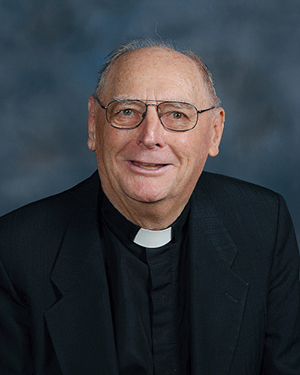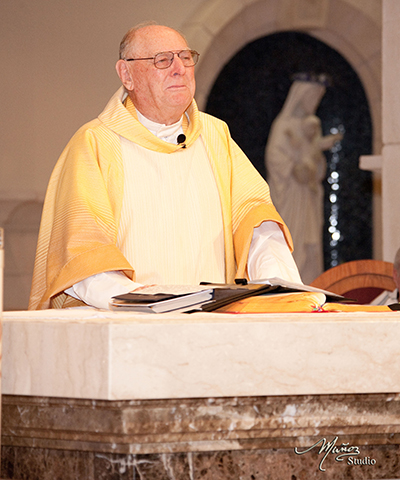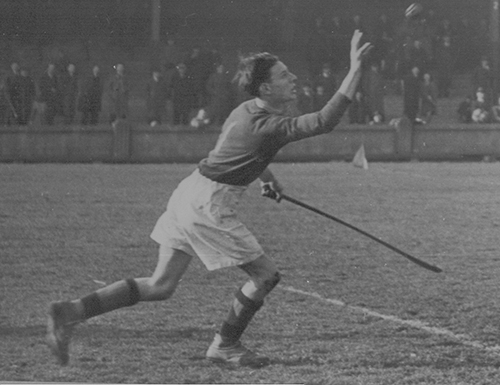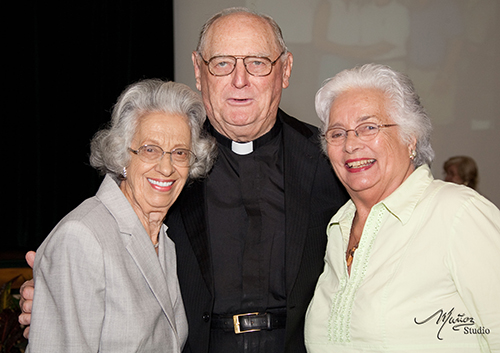By Ana Rodriguez Soto - The Archdiocese of Miami

Msgr. Noel T. Fogarty: Born Dec. 30, 1928; ordained June 2, 1957; died May 11, 2016.
MIAMI | In 58 years of priesthood, Msgr. Noel Fogarty held a plethora of positions: teacher, pastor, chaplain, chancellor, vicar general, dean, president of the priests’ senate and chairman of many boards. But perhaps his most unique assignment was as recruiter of Irish clergy for South Florida.
“Every September it was a battle. About 20 to 30 dioceses were vying to recruit seminarians,” he recalled in a 2004 profile for the Building the City of God series.
And so it came to be that Msgr. Fogarty, a rookie priest himself back in the 1960s, wound up recruiting most of the Irish priests who currently serve or have served in the Archdiocese of Miami.
“At one time, he had 55 seminarians signed up to come to South Florida,” noted an article on Irish priests published in the Florida Catholic in 2014.
Other dioceses offered perks such as cars or a fast track to becoming pastors. Msgr. Fogarty offered no such thing.
“He said it would be a lot of hard work in a growing diocese, and unless you were prepared to work, forget about Miami,” recalled one of his recruits, the now retired Father Thomas Foudy, in that same article.
Leading by example, Msgr. Fogarty kept up that work ethic until his own retirement in 2011 at the age of 82.

Photographer: COURTESY PHOTO | Muñoz Studio,
Msgr. Noel Fogarty prays at altar during his last Mass as pastor of St. Gregory the Great Parish in Plantation.
Although he once said he feared retirement � “I don’t know what I’d do on a Monday morning if I had to face a week with nothing specific to do” � he did get to enjoy many Tuesdays on the golf course with his priest buddies before being diagnosed with an inoperable brain tumor in mid-February.
“The one thing he did not enjoy about his retirement, the one thing he missed most, was the school children,” said Msgr. Jude O’Doherty, pastor of Epiphany Church in South Miami, and another of Msgr. Fogarty’s Irish recruits.
Msgr. Fogarty died May 11 at age 87.“He did not have pain but he knew that his brain was not functioning properly. So that was a terrible pain for him,” Msgr. O’Doherty said.
The two had known each other for 51 years.
“He’s pretty much the one who recruited all of us from Ireland,” Msgr. O’Doherty said. “He was a father to a lot of us. We loved to follow him and his example.”
He called Msgr. Fogarty’s passing “the end of an era” in the Church of Miami. “He was the last priest, I believe, who served the diocese of Miami who also served the Diocese of St. Augustine when the state was just one diocese.”
“He was vicar general to Archbishop Coleman Carroll when the diocese grew the most and the fastest,” said Archbishop Thomas Wenski. “Because of his involvement in the early days of this local Church, his passing means we lose a treasure trove of historical memory.”
‘Architect’ of the diocese
“That man has been like an architect in this diocese,” said Vilma Angulo. “He would talk about things that had happened in the diocese in the 1950s, because he lived it.”
Angulo worked with Msgr. Fogarty for 14 years as director of the religious education program at St. Gregory, where he was pastor from 1991 until his retirement.
She described Msgr. Fogarty as “an excellent administrator. He brought out the best of people. He expected excellence but he liked to be creative, step outside the box. He would listen and be supportive.”
But the tall, gravel-voiced Irishman was no push-over.
“If he had been an attorney, you would hate to be in a courtroom against him,” Angulo said. “He was tough. He stood his ground. But he knew where he wanted to take the parish and he did it.”
Priority: Catholic schools
When he was assigned to St. Gregory after 20 years as pastor of St. Rose of Lima in Miami Shores, “most pastors would have been looking toward retirement,” Angulo said. “He took on a monumental challenge.”

Before becoming a priest, Msgr. Noel Fogarty was a nationally-recognized hurling goalkeeper. Hurling is an ancient Irish sport, a cross between lacrosse and field hockey played with sticks called hurleys and balls known as sliotars. This photo was taken at the all-Ireland colleges semi-final in 1946. Although Msgr. Fogarty's side lost, the national newspaper praised his stellar goalkeeping.
Within months of arriving, he began raising funds to rebuild and enlarge the parish school, going from two to three classrooms in every grade. By September 1995, he had built a state-of-the-art pre-k through eighth grade school and “gymnatorium” that could accommodate over 800 students.
“He knew we had to build a larger school because kids were his passion � and education,” Angulo said.
Both St. Rose and St. Gregory schools developed an excellent academic reputation, winning the Blue Ribbon of Excellence from the U.S. Department of Education. But that’s not what mattered most in Msgr. Fogarty’s view.
Angulo remembers that St. Gregory had about 100 applicants for 50 pre-school spots, and Msgr. Fogarty would interview the families personally. If they told him academics was the reason they wanted their children at the school, he would tell them frankly: “This might not be the place for you. Because this is a Catholic school for families who want to grow in their faith and raise their children in the faith.”
When January came around, he would get a list of the school parents who were not attending Mass regularly � and start making phone calls.
'We're going in'
To illustrate the sheer force of his personality, Angulo recalled a story Msgr. Fogarty told about going to visit a dying priest at Mercy Hospital with Archbishop Carroll. A nurse told them they couldn’t go in because there were too many people in the room already.
So Msgr. Fogarty asked the nurse: Do you know where you work? Mercy Hospital, she replied. Do you know the name of this building? Carroll Tower, she replied. “This is Carroll,” he told her, pointing to the archbishop. “We’re going in.”
“He was, you could say, a hard task master but he was a steady rock,” said Msgr. O’Doherty. “He was a mentor and example to priests. And he was a pastor to his parishioners.”
Hurling, teaching
Born Dec. 30, 1928 in County Galway, Ireland, Msgr. Fogarty was the sixth of seven children. Before entering the seminary, he was a nationally-recognized goalkeeper in hurling � an ancient Irish sport that is a cross between lacrosse and field hockey.
His father, a teacher, wanted him to follow in his footsteps, but he had felt the calling to the priesthood in his fourth year of high school. He entered St. Patrick’s College, Maynooth, completed his theological training at St. Peter’s College, Wexford, and was ordained June 2, 1957 for the Diocese of St. Augustine, which then covered all of Florida.
When the Diocese of Miami was created a year later, he was serving as parochial vicar at St. Mary Magdalen on Miami Beach (now Sunny Isles Beach).

Photographer: COURTESY PHOTO | Muñoz Studio,
Msgr. Noel Fogarty poses after his retirement Mass in 2011 with Ann Schandelmayer and Connie Sessions, who have been parishioners at St. Gregory since the 1960s.
He then served as parochial vicar at Epiphany while teaching at Christopher Columbus High School in Miami, and at St. Mary Cathedral while teaching at the all-girls Notre Dame Academy (now co-ed Archbishop Curley-Notre Dame Prep).
In 1962, he served a few months as parochial vicar at St. Brendan in Miami before being named administrator of the newly established parish of St. Bartholomew in Miramar. He supervised the construction of the church, school and convent there while also serving as chaplain to the South Florida Mental Hospital nearby.
In 1971, he was named pastor of St. Rose, and a year later took on the added responsibility of serving as archdiocesan chancellor, vicar for clergy, and vicar general under Archbishop Carroll.
A Mercedes
When he left the post in 1978, “166 of his brother priests” threw him a surprise party, according to an article in The Voice, which was then the archdiocesan newspaper. They also bought him a new Mercedes Benz: “just to thank him for the wonderful job he did for over six years as the chancellor and as a priest-friend.”
Msgr. Fogarty also served as director of lay retreats from 1961 to 1966, a task that entailed “how to promote them, where to hold them, and who should make them.”
A talented fundraiser, he created endowments to ensure the continued financial stability of both St. Rose and St. Gregory schools.
He also served on various archdiocesan boards, including those that oversaw seminaries, schools and the health and pension plans for priests and lay employees.
Asked to name his greatest accomplishment, he cited recruiting Irish priests and “helping to steer the Pension Plan � to its present stable position as one of the better diocesan retirement plans in the nation.”
Msgr. Fogarty was given the honorary title of monsignor in 1974 by Pope Paul VI, and raised to its highest rank, Protonotary Apostolic, by Pope John Paul II in 1995.
The viewing will take place Monday, May 16, beginning at 5 p.m. at St. Gregory Church, 200 N. University Drive, Plantation, with a prayer service at 7 p.m. Archbishop Wenski will celebrate the funeral Mass at 10 a.m. Tuesday, May 17, at St. Gregory.
Msgr. Fogarty will be buried at Our Lady Queen of Heaven Cemetery in North Lauderdale. He is survived by two siblings, Anna and William, and a number of nieces and nephews, all of whom live in Ireland.


Comments from readers